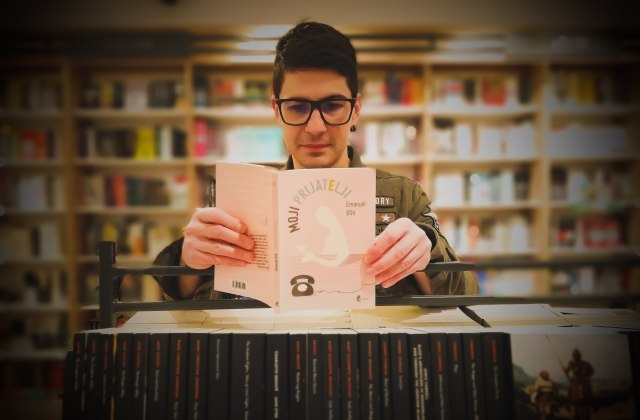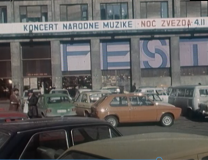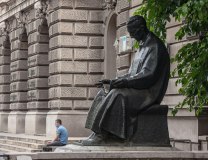How Peter Handke revived the novel "My Friends" by Emmanuel Bove
Emmanuel Bove, a French writer, remained somewhat forgotten after the Second World War.
Source: B92
The reasons for this could be found in the new era after the war, the new values and aspirations by which the events and stories of only a few years old seemed like ancient history. When it comes to Bove, the reason is different. After the war, in his novels, he insisted on the attitude of the French during the Vichy regime. The (post) war intellectuals, led by Sartre, were not ready to accept the criticism at their own expense, as well as to a not-so-well perception of the Resistance Movement. His stories "The Trap" and “Night departure", which were published immediately after the liberation, speak of the French cowardice as well as the diversions of the country under General Paten.
"When I leave the house, I always hope that some event will turn my life upside down. I wait for it until I go home. That's why I never stay in my room."
History is written by winners and Bove dared to add some, completely inappropriate (still indisputable), painful truths to the margins of such history. That is why he was "cleansed" from the post-war literary scene, and it will take decades for interest in his works to begin to reappear.
"Those who love me and understand me at least a little are so few."
Emmanuel Bove, as the oldest child, was born in Paris in 1898. His last name was Bobnikov. The son of a Russian Jew and a woman from Luxembourg. The early divorce of his parents forced little Emanuel to spend his childhood torn between one parent and their new families. Apart from the family, it was also a matter of economic division. The father and stepmother lived like royalty, while his mother and younger brother were doomed to misery. This class mood will leave a strong imprint on his early works in making the money and survival as the main motives.
"Life is so sorrowful when you're so alone and when you only talk to people who are indifferent to you."
The funds provided by his mother were sufficient for his education in England. However, thanks to his nature, Bove ended this educational adventure with failure and "retreat to reserve positions" in Paris, where he spent the last years of World War I. There, according to some biographers, he was arrested "for a suspicious surname and idleness", and he was released only to be sent to the army during the last months of the Great War.
It was in those days that he made the decision to become a writer for the most pragmatic reason possible. He thought that writing was the fastest and easiest way to earn money. After three years he spent as a soldier (who never saw the frontline) Bove gets married and goes to Vienna to submit himself to writing. He returns from Vienna with a manuscript of what will become his first novel "My Friends". The Paris audience will welcome this literary debut with enthusiasm.
The protagonist of the novel is the sympathetic and awkward vagabond named Button Victor. He served in the war in which he earned a severe wound and from where he draws military decorations and fit-for-nothing left hand. In the years after the war, he lived in misery, dreaming of wealth, living like a king, and, above all, friendship. Button wants to find a friend who will love him, understand him, and accept him. However, all his attempts to approach a living being are doomed, largely because of Baton's mistakes.
"That’s the story of my life. No one has ever responded to my love. I just want to love, to have a friend, and still, I am alone. They give me a dime, then they run away from me. Lady Luck never ever looked on me".
Each of the six chapters of the book represents an episode, just like in a television series, and Button tries to get closer to someone he meets. Each chapter ends with its failure and further impoverishment.
The button is thrifty on himself but generous on potential friends or girlfriends. The little money from the disability allowance he receives every three months is invested in friendship. Most of the time, he is left without money and without friends.
"Lord, what can make us happier then the desire to give everything we have and to look with empty hands at the one we have just made happy?"
The writing style is simple, picturesque, and easy-to-read; these adventures irresistibly resemble the images of Charlie Chaplin and Buster Keaton (and the author of these lines believe that Beckett also learned a lot just by reading the novel "My Friends"). Probably that was the reason why the audience accepted this short novel so easily and gladly. It is a witty and entertaining work that does not lack an abundance of details and complex psychological optics.
Button’s misfortune is anything but one-dimensional. Quite on the contrary. It is a complex study of a person, which, again, is presented in a simple and unconventional way. In some later works, Bove will show a desire to deal with the history and emotional-psychological background of his heroes in a more conventional literary way, weakening the indisputable appeal of the first novels.
"It's amazing how pleasant the memory of the places we were unhappy becomes."
The more he writes in the common and bourgeois style, gradually abandoning the style and form he set in his first novel, the weaker the audience's interest in his works will become. He will never repeat the success he achieved with the novel "My Friends" again.
"I'm looking for a friend. It looks like I'll never find one."
His nature is also responsible for the latter. A convinced anti-fascist, after 1939, Bove refused to publish in France. He moved to Algeria with the idea that there, from the free territory, he would write about Vichy’s France and, perhaps, flee to London. As we noticed at the beginning of the text, the Fifth French Republic does not like awkward truths and Bove was slowly falling into oblivion. He died of pneumonia in July 1945.
"Until I make some perfect friends I dream of, in the meantime I can settle for anyone available."
His biographers blamed his wife who asked too much money for republishing, explaining the consequential lack of interest in republishing Bove's works. It is interesting that a renewed interest in Bove's works in France was initiated by an Austrian. Peter Handke somehow got his hands on the novel "My Friends", translated it into German, and published it in Zurkamp in 1981. It was the revival of Bove in the German-speaking environment that will once again awake the interest in France for the works of the forgotten author.
Soon, Bove's works, editions on critics, and biographies are published in French. Recently, the Official Gazette published the Serbian edition of the book "My Friends" translated by Bojan Savic Ostojic (with his excellent afterword). This is a nice opportunity for our audience to get acquainted with probably the best and, certainly, the funniest and wittiest part of this, at least in Serbia, little-known author.
Written by: Milan Arand
www.bookvar.rs
jelovic











